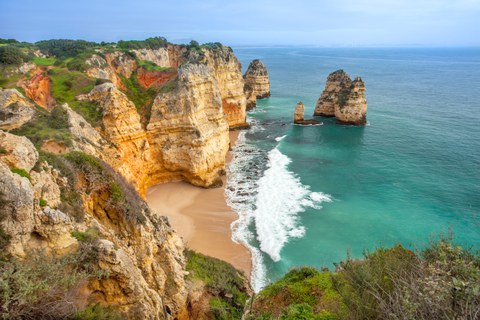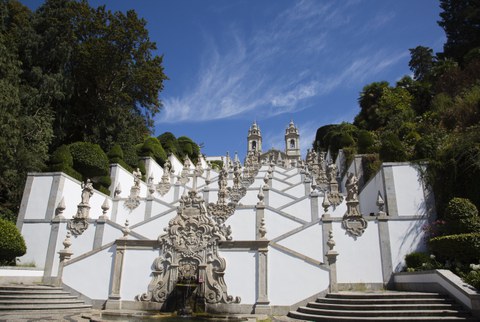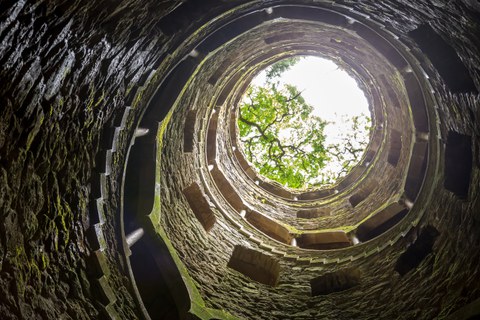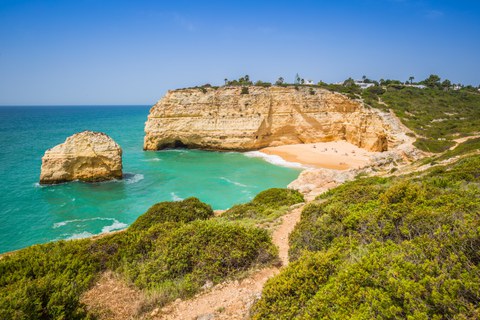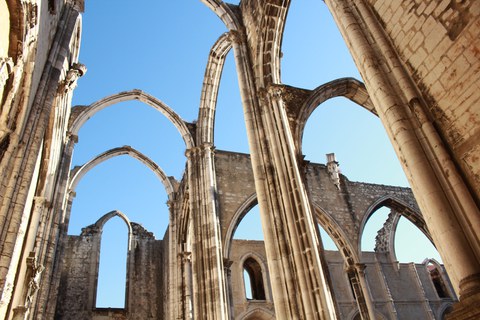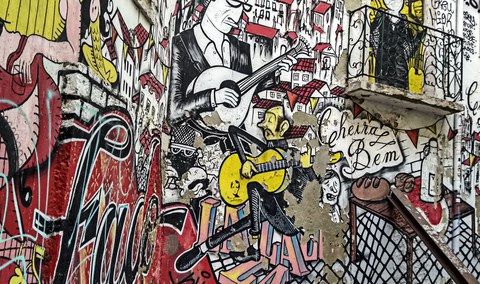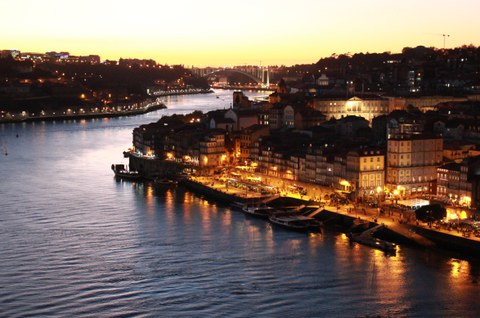Partnerland des Monats April 2022: Portugal
Als kleines Nachbarland Spaniens ist Portugal leicht zu übersehen – wer das tut, verpasst allerdings einiges. Das ganz am südwestlichen Zipfel Europas gelegene Land ist nicht nur sonnig, warm und hat wunderschöne Küsten, sondern kann auch auf eine ungewöhnlich lange Geschichte zurückblicken. Portugal besteht seit 1255 in seinen heutigen Grenzen und war jahrhundertelang berühmte Seefahrernation und globales Imperium. Dies ist mittlerweile Vergangenheit. Das heutige Portugal gilt als eines der friedlichsten Länder der Welt und hat viel zu bieten – zum Beispiel Städte, die durch Street Art und kunstvolle Fliesendekoration ein Gesamtkunstwerk sind.
Mit der Aktion "Partnerland des Monats" richten wir den Scheinwerfer auf die große Vielfalt der Länder, Regionen und Partneruniversitäten der TU Dresden, in denen unsere Studierenden ein Auslandssemester verbringen können.
Inhaltsverzeichnis
Allgemeine Zahlen und Fakten zu Portugal
Hauptstadt: Lissabon
Einwohner: 10,3 Millionen (2021)
Amtssprache: Portugiesisch
Nationalfeiertag: Dia de Portugal am 10. Juni (Todestag des Nationaldichters)
Währung: Euro
Weitere Zahlen, Fakten und Infos findest du auf den Seiten des Auswärtigen Amts, auf Wikipedia oder bei den DAAD-Länderinformationen. Touristische Infos gibt es z.B. auf visitportugal.com.
Kleiner Sprachexkurs
- Hallo – Olá
- Wie geht’s? – Tudo bem?
- Ich heiße … – Me chamo …
- Schön, dich kennenzulernen – Prazer em conhecer-te
- Danke – Obrigado/a
- Bis später – Até logo
Portugiesisch ist eine der weltweit meistgesprochenen Sprachen, die Bevölkerung Portugals macht dabei aber nur einen Sprecheranteil von 5% aus. Der weitaus größte Anteil kommt aus Brasilien. Aber auch in Angola und in Mosambik gibt es eine größere Anzahl von Menschen, die Portugiesisch sprechen, als in Portugal. Durch die Kolonialgeschichte Portugals erfuhr die Sprache eine weite Verbreitung und ist heute Amtssprache in neun Ländern. Portugiesisch ist mit dem Spanischen eng verwandt und gehört wie dieses zu den romanischen Sprachen.
Neben Portugiesisch haben unsere Partnerunis auch auf Englisch ein breites Kursangebot, daher könnt ihr gut auch ohne vorherige Portugiesischkenntnisse ein Semester in Portugal verbringen. Schaut aber bitte vor eurer Bewerbung, was genau die jeweiligen Voraussetzungen sind.
Auch außerhalb der Uni kommt man mit Englisch in Portugal gut zurecht. In einem internationalen Englisch-Ranking erreichte Portugal den 7. Platz und liegt damit weit vor Ländern wie Frankreich, Spanien oder Italien, und auch einige Plätze vor Deutschland. Trotzdem helfen ein paar Portugiesischkenntnisse natürlich enorm beim Einleben in die portugiesische Kultur. In Dresden gibt es Sprachkurse z.B. bei TUDIAS oder an der VHS.
Wer bereits etwas Portugiesisch kann, hat mit einiger Wahrscheinlichkeit bessere Bekanntschaft mit dem brasilianischen als mit dem europäischen Portugiesisch gemacht – als meistgesprochene Variante wird dieses auch am häufigsten gelehrt. Die Varianten sind deutlich unterschiedlich, insbesondere in der Aussprache, aber auch im Vokabular. Also nicht wundern, sollte es mit dem Verständnis nicht sofort super funktionieren. Nach etwas Reinhören klappt es besser!
Wusstest Du schon, dass ....?
- Lissabon die zweitälteste Hauptstadt Europas ist? Das Stadtgebiet wurde vor ca. 3.200 Jahren von den Phöniziern besiedelt. Damit ist Lissabon ganze 400 Jahre älter als Rom. Unter Europas Hauptstädten wurde nur Athen noch früher gegründet.
-
portugiesische Geldautomaten wahre Multitalente sind? Geld abzuheben ist lange nicht ihre einzige Funktion. Die Geräte ermöglichen ca. 60 weitere Aktionen, darunter: Bahn- oder Konzerttickets kaufen, Handy aufladen, Geld spenden, Strom- und andere Haushaltsgebühren bezahlen, und sogar den Erwerb eines Jagd- oder Angelscheins. Kein Wunder, dass die Dichte von Bankautomaten in Portugal besonders hoch ist.
-
indisches Essen ohne Portugal nicht scharf wäre? Die Chilipflanze stammt ursprünglich aus Südamerika und wurde von portugiesischen Seefahrern nach Asien gebracht. Diese hatten allgemein einen großen Einfluss auf die internationale Küche. Auch Tomaten und Kartoffeln verbreiteten sie aus Südamerika um die Welt. Sie brachten sogar das Frittieren als Gartechnik nach Japan.
-
Portugal hauptsächlich aus Wasser besteht? Der Meeresbereich, über den es verfügt, ist ca. 18 Mal größer als die Landesfläche. Das liegt daran, dass mit den Azoren und Madeira einige Inseln zu Portugal gehören. Daher kann das Land auch die Meeresbereiche für sich beanspruchen, die die Inseln umgeben, statt nur die, die ans portugiesische Festland grenzen.
-
Portugal das erste Land ist, das den Konsum aller Drogen entkriminalisiert hat? Wird eine Person mit Drogen aufgegriffen, werden diese zwar konfisziert, aber weder der Besitz von kleineren Mengen noch Drogenkonsum zählen als Straftat (Drogenhandel hingegen schon). Der Leitsatz hinter der portugiesischen Drogenpolitik: Abhängige brauchen Hilfe, nicht Bestrafung. Daher gibt es statt einer Anzeige die Aufforderung, eine Suchtberatungsstelle aufzusuchen. Das Ergebnis dieser Politik: Der Drogenkonsum ist nicht angestiegen, dafür sind Drogentote und HIV-Infektionen seltener geworden.
-
Handtücher ein sehr beliebtes Mitbringsel aus Portugal sind, vor allem für Reisende aus Spanien? Die Handtuchherstellung hat in Portugal Tradition und im Nachbarland sind portugiesische Handtücher berühmt dafür, besonders weich und hochwertig zu sein.
Kooperationen mit der TU Dresden
Eine Übersicht über alle Kooperationen der TU Dresden gibt es in unserer Datenbank. Dort kannst du auch in den Erfahrungsberichten bisheriger Austauschstudierender stöbern. Es lohnt sich außerdem oft, in der eigenen Fakultät Professor:innen zu fragen, die direkte Kontakte zur gewünschten Partneruni haben.
Unsere Kooperationen mit portugiesischen Universitäten laufen über Erasmus+. Die Ansprechpartner:innen und Bewerbungsfristen für deine Fakultät findest du hier.
Erasmus+Kooperationen der TU Dresden in Portugal
- Instituto Politécnico de Beja
- Wirtschaftswissenschaften
- Universidade de Coimbra
- Sozialpädagogik, Sozialarbeit und Wohlfahrtwissenschaften
- Architektur
- Universidade de Évora
- Psychologie
- Forstwissenschaften
- Geowissenschaften
- Universidade de Madeira in Funchal auf Madeira
- Werkstoffwissenschaft
- Universidade do Minho Standort Guimarães
- Werkstoffwissenschaft
-
Universidade Nova de Lisboa in Lissabon
- Informatik
- Hydrowissenschaften
- Bauingenieurwesen
- ISCTE IUL - Instituto Universitário de Lisboa in Lissabon
- Psychologie
- Wirtschaftswissenschaften
- Universidade de Lisboa in Lissabon
- Geschichte
- Physik
- Medizin
- Bauingenieurwesen
- Luft- und Raumfahrttechnik
- Landschaftsarchitektur
- Universidade do Porto
- Maschinenwesen/Fakultät gesamt
- Architektur
- Bauingenieurwesen
- Universidade Católica Portuguesa in Porto
- Biologie
Don't miss...
Sintra. Dieser Ort wie aus einer märchenhaften Parallelwelt war im 19. Jahrhundert beliebtes Ziel von reichen Großbürgern, Künstlern und Industriellen. Sie bauten fantastische Anwesen, die mittlerweile zum UNESCO Weltkulturerbe zählen. Besonders sehenswert ist Quinta da Regaleira mit seinen künstlichen Grotten, Quellen, Ruinen und mystischen Brunnen. Auch der bizarre Palácio Nacional Pena, der arabisch inspirierte Palácio de Montserrate sowie die alte Maurenfestung sind einen Besuch wert.
Sete Vales Suspensos. Dieser Wanderweg, der an der zerklüfteten Steilküste nahe Lagoa entlangführt, bietet wunderbare Aussichten auf die Landschaft der südportugiesischen Algarve – voller schroffer Felsentore und -formationen, zwischen denen sich Zugänge zu malerischen Sandstränden öffnen. Auf dem Weg nicht verpassen: Die Benagil-Höhle (schwimmend oder per Boot) und die Praia da Marinha. Auch ein Abstecher zum nahe gelegenen Algar dos Capitães lohnt sich.
Convento do Carmo. Dieses ehemalige Kloster ist eine Ruine, seit 1755 ein verheerendes Erdbeben Lissabon zerstörte. Das Ausmaß der Katastrophe brachte Philosophen in ganz Europa dazu, ihre Weltanschauungen zu hinterfragen. Lissabon wurde wieder aufgebaut, wobei die Struktur der neuen Häuser mittels hölzerner Modelle, um die Truppen herummarschierten, auf Erdbebensicherheit getestet wurde. Als malerisches Mahnmal blieb die Klosterruine. Mittlerweile beinhaltet sie ein archäologisches Museum und ist im Sommer Schauplatz von Konzerten - also werft einen Blick in den Veranstaltungskalender.
Streetart in Lissabon. Streetart spielt in ganz Portugal eine wichtige Rolle, aber ganz besonders in der Hauptstadt. Hier wird künstlerisches Graffiti sogar städtisch gefördert und ist an allen Ecken zu finden. Vielleicht entdeckt ihr das ein oder andere Werk des Künstlers Bordalo II, der aus in den Straßen gesammeltem Müll und Schrott detaillierte, bemalte Tierskulpturen erschafft. Auch besonders sehenswert: Die Street Art Gallery in der Calçada da Glória.
Festa de São João in Porto. In der Nacht des 23. Juni verwandeln sich die Straßen von Porto in ein großes Fest voller Essensstände, Straßenkonzerte, Tanz und Feuerwerk. Allerdings sollte man sich vorher mit ein paar Küchenzutaten ausrüsten – und kann sich geschmeichelt fühlen, wenn man selbst welche abbekommt. Nach altem Liebeswerbungs-Brauch versucht man hier, Personen, die man attraktiv findet, mit einem Strauß aus Lauch zu treffen oder ihnen Stängel von Zitronenmelisse auf den Kopf zu legen.
Lasst uns kochen...
Die portugiesische Küche ist im Allgemeinen einfach und deftig. Im Zentrum der Gerichte stehen meist Fisch, Meeresfrüchte oder Fleisch. Unzählige Gerichte drehen sich um Sardinen oder getrockneten und gesalzenen Kabeljau (bacalhau) – kein Wunder, dass Portugal in den Top 5 der Länder mit dem höchsten Pro-Kopf-Konsum von Fisch liegt. Beliebt sind auch Suppen und Eintöpfe. Nicht zu vergessen ist natürlich der Portwein, Portugals Nationalgetränk und bekanntestes Exportgut.
Eine Besonderheit der portugiesischen Esskultur, die ihr nicht verpassen solltet, sind die Petiscos. Diese sind (ähnlich wie Tapas) verschiedenste Spezialitäten, die in kleinen Portionen serviert werden. Meist teilt man sie sich mit allem am Tisch. Das Geniale daran: Wenn Petiscos bestellt werden, kann jeder ganz einfach von allem ein bisschen kosten.
Pastel de Nata
Typischer portugiesisch als diese Puddingtörtchen wird es nicht! Sie sind das bekannteste Beispiel der Doçaria Conventual, ein Begriff, unter dem man Süßwaren versteht, die in Klöstern erfunden wurden – und das betrifft einen großen Teil der traditionellen portugiesischen Leckereien. Entsprechend religiös sind auch oft deren Namen, so gibt es z.B. Nonnenbauch (barriga de freira), Engelsdoppelkinn (papo de anjo) und Himmelsspeck (toucinho do céu) zu probieren. Der Grund hierfür ist, dass Nonnen und Mönche früher viele Eiweiße beim Waschen ihrer Ordensgewänder verwendeten. Doch was fingen sie dann mit den vielen übrigen Eigelben an? Etwas Leckeres daraus backen, natürlich!
Zutaten für 12 Törtchen:
- 1 Pack Blätterteig
- 250 ml Milch
- 30 g Mehl
- 4 Eigelbe
- 150 g Zucker
- 75 ml Wasser
- Nach Belieben: Schale einer Bio-Zitrone, Zimt
Zum Backen werden außerdem 12 Muffinförmchen benötigt.
Zubereitung
1. Blätterteig ausrollen und in 12 gleiche Teile schneiden. Ofen auf 230°C vorheizen.
2. Bei Verwendung fester Muffinförmchen diese leicht fetten. In jedes Muffinförmchen kommt ein Stück Blätterteig. Den Teig mit den Fingern jeweils im Förmchen verteilen, sodass es gut ausgefüllt wird.
3. Zitronenschale grob abreiben und mit 150 ml der Milch in einem Topf erwärmen. Den Rest der Milch in einem separaten Gefäß mit dem Mehl verrühren. Wenn die Milch im Topf beginnt zu kochen, wird die Mehlmischung unter Rühren hinzugegeben. Ständig weiterrühren, bis die Mischung andickt. Zum Rühren möglichst einen Schneebesen verwenden.
4. Zitronenschale aus der entstandenen Creme heraussieben oder -sammeln.
5. In einem separaten Topf Wasser und Zucker zum Kochen bringen, 4 min köcheln lassen. Dann die Zuckerbrühe nach und nach in die Creme einrühren. Einige Minuten abkühlen lassen, bis sich die Mischung nicht mehr unangenehm heiß anfühlt.
6. Eigelbe hinzugeben und gut umrühren. Die fertige Mischung in die Muffinförmchen füllen, dabei nicht komplett auffüllen, sondern oben etwas Platz lassen. 15 min bei Ober-/Unterhitze backen. Am Ende nach Geschmack mit Zimt bestäuben.
Bom apetite!
(Vielen Dank an petitchef.com!)
Kontakt und weitere Ansprechpersonen
Hattest du eine tolle Zeit in Portugal? Hast du Tipps für Orte und Erlebnisse, die man nicht missen sollte? Gern teilen wir auch deine Erfahrungen – hier, über Social Media oder auch, wenn du Lust hast, bei Infoveranstaltungen mit anderen TUD-Studierenden. Melde dich bei uns:
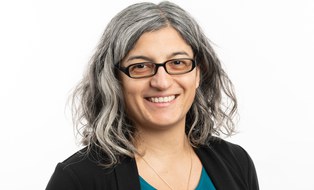 © Sven Ellger/TUD
© Sven Ellger/TUD
Beratung zum Studium im Ausland
NameFrau Federica Serra
Infocenter / TUD weltweit: Amerika, Australien und UK / PROMOS
Eine verschlüsselte E-Mail über das SecureMail-Portal versenden (nur für TUD-externe Personen).
Besuchsadresse:
Fritz Foerster Bau, Büro 156 Mommsenstraße 6
01069 Dresden
Postadresse:
Technische Universität Dresden International Office
01062 Dresden
Sprechzeiten:
- Dienstag:
- 09:30 - 11:30
- 12:30 - 14:30
- Donnerstag:
- 09:30 - 11:30
Bitte im SCS (FOE UG) anmelden. **Keine Sprechzeit in dem Zeitraum 12. - 20.02.2026 **
Partnerländer Archiv
Hast du ein Partnerland verpasst? Kein Problem! Hier sammeln wir alle Seiten für dich zum Nachlesen.
|
Europa (Erasmus+) |
|
|
Afrika |
|
|
Amerika |
|
|
Asien |
|
|
Australien und Ozeanien |
|

